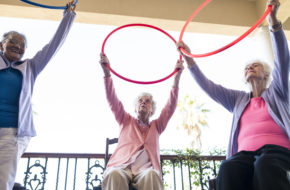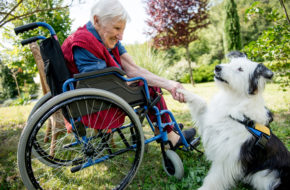I took a 95-year-old relative for minor surgery recently and, afterward, she complained just a little about having had to put up with the inconvenience of the procedure.
As several family members have chuckled on occasion, our relative is quite fortunate overall. While she had to care for her husband as he faced health issues for a number of years, she’s had relatively few significant health issues herself.
And she still lives alone—and drives! Undoubtedly, most of us hope for that future.
Unfortunately, as we age, the likelihood increases that we may face varying issues including chronic health conditions or other diseases, surgeries or falls. Often, those situations can be improved with short-term rehabilitation.
Short-term rehab encompasses physical, occupational and speech therapies that can help people reach their individual potential and, quite frequently, return to the lives they love.
The care team at a short-term rehabilitation center creates a personalized plan that can help older adults regain strength, manage medical conditions and transition back home. In addition to offering care around-the-clock, these centers also typically offer education and resources for both seniors and their families.
Many short-term rehabilitation centers, such as those operated by Diakon Senior Living Services, offer private and semi-private suites, therapy gyms and personalized instruction, nutritious dining designed to enhance health, and space for socializing. The goal is an overall positive experience that helps patients thrive.
If my relative required short-term rehab, it’s likely she would say she did not need it. She would not be alone in that self-assessment. Many older adults tend to decline short-term rehabilitation after being released from the hospital. Often, this is because they’d rather go home and don’t see the value in rehabilitation, according to Aging Care.
You can help them to understand their stay is only temporary—and it can lead to their remaining healthier longer. In fact, if they return home too soon and aren’t yet healed properly, they can be setting themselves up for a longer stay in rehabilitation later on.
To make this process easier on your loved one, click here to read about a few things you can do.
Monthly Archives: July 2019
Making benefits even more appealing
It was more than four decades ago, but I can still vividly recall the setting.
I was sitting in an office of Human Resources, at that time called “Personnel,” on the second floor of Tressler-Lutheran Service Associates’ Camp Hill, Pennsylvania, office building, converted from the old Lutheran Home on the West Shore.
Six months had passed since my initial employment with Tressler and my discussion with one of the two staff members then in Personnel centered on my selection of benefits, which were now available to me.
Did I want to sign up for a pension contribution?
“Nope,” I asserted, testament to my naiveté at that age. I later attributed that poor decision to the small salary I was receiving; after all, it was 1978 and the salary at my former position, as a newspaper reporter and editor, had been even smaller.
Fortunately, I eventually came to my senses and signed up for Tressler’s 403(b) plan.
While most employees now know better than to wait for benefits, especially as employers focus on comprehensive orientation programs, many organizations still impose a “probationary period” before employees can receive benefits such as health-care coverage.
Diakon has been one those employers, but no longer.
Beginning Aug. 1, Diakon joins the list of forward-focused organizations offering “Day 1 health-care benefits.” That means new employees—both full- and part-time—can immediately sign up for health-care coverage, including medical, dental, vision and prescription drug coverage.
Other benefits, including tuition assistance, retirement plan, and disability insurance, still require waiting for the probationary period to end, but nearly all employees are most concerned about health-care insurance, so the change is a very welcomed one.
Making Day 1 employment today much better—and smarter—than mine 41 years ago.
By William Swanger, MA, APR, Fellow PRSA
Senior Vice President
Corporate Communications & Public Relations
Because we review comments, they do not appear immediately. Please do not submit each comment more than once. Please review our comment policy.
Personal Care: Fact vs. Myth
I love when we’re able to help people gain the care they need, but often don’t want to seek, typically for a variety of reasons.
Right now, several Diakon senior living communities, Diakon Senior Living – Hagerstown among them, are helping motivate people to seek personal care or, as it is known here in Maryland, assisted living—through various incentives.
But why might older adults who need such care not seek it immediately? Certainly, as people grow older, they may notice changes in abilities. Whether someone has suffered a fall, is recovering from a surgery or simply needs assistance completing the typical tasks of daily living, personal care may be of great benefit.
But when some older adults hear the phrase “personal care,” they may have a negative reaction.
They think, for example, that they don’t need any help and that they are still sufficiently independent to continue caring for themselves.
That perspective is understandable, but family members and other friends may quickly spot the need for assistance.
What are signs a loved one may benefit from personal care?
Is a loved one no longer taking care of him- or herself? Wearing the same clothing for more than a day? No longer seeming to care about appearance?
If so, the person may be having trouble completing these tasks or attending to basic needs. Not only can this situation decrease confidence, but it can also continue to affect independence.
If loved ones react negatively to the idea of personal care, they may be falling victim to myths they’ve heard. To combat this, you could help to dispel those myths …
● Personal care will decrease my independence. This couldn’t be further from the truth; in fact, personal care can actually enrich your quality of life enough that you may become more independent. For example, if you don’t need to spend time worrying about certain activities of daily life, you may be able to focus more fully on wellness, improving your health through exercise and participating in more lifelong-learning opportunities.
To read more about dispelling the myths about personal care, please click here.
Giving at-risk youths their second chance …
This wasn’t my typical assignment.
Stephanie Rivera had accepted a ride with a family member and his friend, not knowing that decision would have an immediate impact on her life. Unaware that the car had been stolen, the 17-year-old found herself in trouble with the law. Instead of starting her high-school senior year looking forward to prom and graduation, she faced having to clear her record and pay off costly fines.
It was at this point that Stephanie, who had never been in trouble with the law, really needed someone to be her guide through what lay ahead. Fortunately, she was motivated to succeed and accepted responsibility for her actions.
As a case-manager for Diakon Youth Services’ Bridge Program, I walk alongside and mentor students enrolled in our community-based, weekday support and intervention service through their county’s juvenile probation office.
Unlike Stephanie, most of them have been in trouble multiple times. Based on a therapeutic approach to accountability, the program helps these adolescents build a foundation of self-discipline and respect for family, teachers, the law and self.
In addition to working with them on educational and workforce-development goals, I offer them my time.
For Stephanie, this has meant things such as picking her up after school, driving her to her court hearings, taking her to lunch on her birthday and simply providing an ear to listen. With that guidance and a little TLC, she got her permit, a job and faithfully saved week after week to pay off her restitution. She also graduated from high school and enrolled in college.
Despite her hard work, however, her long-range plan of joining the Army remained out of reach. As a minor, she had had her fine grouped with that of her family member and friend, who refused to pay their share. If she wanted to move on and be released from probation, she had to come up with $500 on her own.
Knowing it’s always important to have a Plan B, I approached my supervisor about the possibility of helping Stephanie through Diakon’s Second Chance Fund. The fund helps students who have done well in our program and completed their goals and probation requirements, but do not have all the necessary resources to make restitution.
Recognizing Stephanie’s hard work, my supervisor approved my request and shortly thereafter, Stephanie learned she would be released from probation, her juvenile record expunged. Those steps cleared the way for her to be the first in her family to attend college and eventually join the Army.
Because of generous donors who support Diakon’s Second Chance Fund, students such as Stephanie, who do what we ask of them but fall short in terms of financial ability, will not miss out on their dreams.
They have earned them. They deserve it. And they have gained their second chance.
Marlene Ortiz is a case-manager for Diakon Youth Services’ Bridge program in Chester County. To learn how you can make a donation to the Second Chance Fund, click here.
Because we review comments, they do not appear immediately. Please do not submit each comment more than once. Please review our comment policy.
Six drug-free treatment options for people with cognitive illnesses
While cures may not currently be possible for many forms of cognitive illnesses, are there ways to treat people without the use of drugs?
Some believe it is possible to help manage some of the challenging behaviors and symptoms with a number of drug-free treatment options, including holistic therapies. It’s important to note, however, that many of these are based on trial and error, not scientific research.
In fact, according to the Alzheimer’s Association®, “The rigorous scientific research required by the U.S. Food and Drug Administration for the approval of a prescription drug is not required by law for the marketing of dietary supplements or ‘medical foods.’” This means that side effects, uses and efficiency may not be safely monitored. For that reason, many people tend to opt for a different approach: holistic therapies and lifestyle changes.
Options for older adults with dementia …
There are a number of steps you might test when trying to help a person with Alzheimer’s disease and other forms of dementia. These approaches can affect everyone differently, but through trial and error, you may be better able to help a loved one.
1. Aromatherapy. Some people may become agitated, angry or even depressed as a result of dementia; it can thus be difficult for them to relax or calm down. In these cases, aromatherapy may be able to help. Try rubbing a lavender-scented lotion on their hands or spraying a refreshing citrus room spray to lift spirits in the morning.
2. Massage Therapy. If your loved one doesn’t mind being touched, massage therapy might be something that is good for them. It can not only help to relax the person, but also release oxytocin to promote peace and calm.
3. Pet Therapy. There are few people who don’t instantly light up when they see an animal. Known to be successful in an array of situations, pet therapy can help break up your loved one’s routine and bring joy and happiness. Whether the person prefers the company of a dog or a cat, friendly purrs and wagging tails can make a difference.
For additional drug-free treatment suggestions, please click here!






